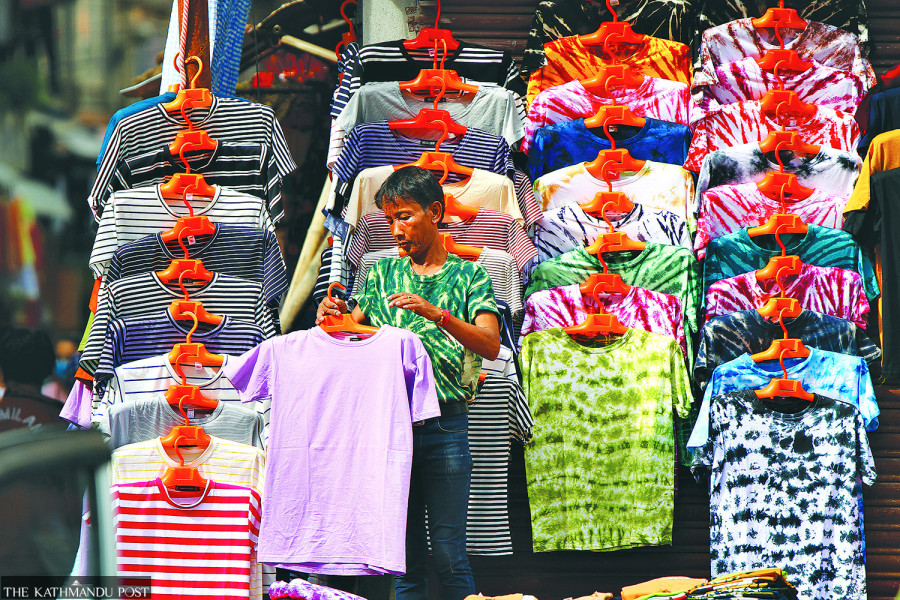Money
Traders hope festival shopping will revitalise economy
Online sales trends and business activity indicators suggest that a fast-paced recovery is underway, insiders say.
Krishana Prasain
With Nepal’s main holiday season drawing closer, free-spending shoppers are expected to set the market on fire and give the virus-battered economy a welcome shot in the arm.
Online sales trends and business activity indicators show that a fast-paced recovery is underway in Nepal’s economy, insiders said.
“We are excited about festival sales. We expect more than a twofold growth in sales during the festival season this year as people seem to be in a celebration mood,” said Surakchya Adhikari, co-founder and chief operating officer at Thulo.com.
The shopping spree begins from Teej, which falls on September 9 this year. Teej is a fasting festival of women in Nepal.
"The online shopping trend shows that people are excited by the approach of the festivals,” said Adhikari.
As the population is gradually getting vaccinated and daily Covid-19 infection caseloads are decreasing, merchants are expecting a sales boom.
Nepal on Tuesday reported 1,523 new coronavirus infections in the last 24 hours, taking the nationwide tally to 762,647. According to the Health Ministry, 141 people tested positive in a total of 3,105 antigen tests.
Consumer spending is the main driver of Nepal's economy.
The Central Bureau of Statistics has revealed that, in the last fiscal year 2020-21 ended mid-July, Nepal’s final consumption expenditure at current prices amounted to Rs3.98 trillion, representing 93.38 percent of the gross domestic product,
As per Nepal Rastra Bank statistics, in the last two decades, remittance earnings increased 20 times, boosting consumption and economic growth although Nepal’s economy suffered a slowdown.
Nepali migrant workers sent home Rs961.05 billion in the last fiscal year, a record-high money transfer to Nepal since Nepalis started going for overseas employment en masse more than two decades ago.
The impact of remittance is seen in imports. According to the statistics released by the Department of Customs, the country’s overall imports grew by 28.66 percent to Rs1.53 trillion in the last fiscal year despite the pandemic.
In 2019-20, Nepal’s economy suffered a negative growth rate for the first time in four decades due to Covid-19. The growth rate in the last fiscal year is expected to be a little under 4 percent, according to the Central Bureau of Statistics.
Consumption patterns and trends through both online and offline shopping amid the Covid-19 pandemic this year are quite optimistic as compared to last year's disappointing market trend, traders said.
Amun Thapa, CEO and founder of Sastodeal, said customer trust in online business had increased sharply. "Orders are being placed even from outside Kathmandu Valley. So we see expectations of sales growth.”
Sastodeal is hiring an extra 500 delivery personnel for festival orders. “We have been working on strengthening our supply chain even in the far western region of the country,” he said.
Many people started buying through online platforms during the first lockdown that was imposed on March 24, 2020. These first-time buyers got hooked and are now regular customers, e-retailers say.
The Dashain and Tihar festivals last year saw an exponential growth in e-commerce business. According to Nepal Rastra Bank, online payments using cards totalled Rs15 billion in the last fiscal year.
With multiple options to make online payments now, traders said that festive consumption would hit a new high.
According to e-retailers, they are mostly focusing on food items, the highest selling product after clothes during festival time. But prices have increased in almost every product segment due to higher shipping costs. Thapa said that prices of television sets and other electronic items had risen this year.
“We have not made any estimates regarding our sales as things are still uncertain. The government may impose a lockdown again,” said Sagar Dev Bhatta, co-founder of Mero Kirana. “But we are in constant contact with the concerned ministries and agencies to make a wise decision this year,” he said.
“If the government does not issue stay-home orders during this festival season, we are optimistic that there will be a sales boom,” he said.
E-retailers are planning for festival sales with bumper offers to woo back customers.




 23.2°C Kathmandu
23.2°C Kathmandu














